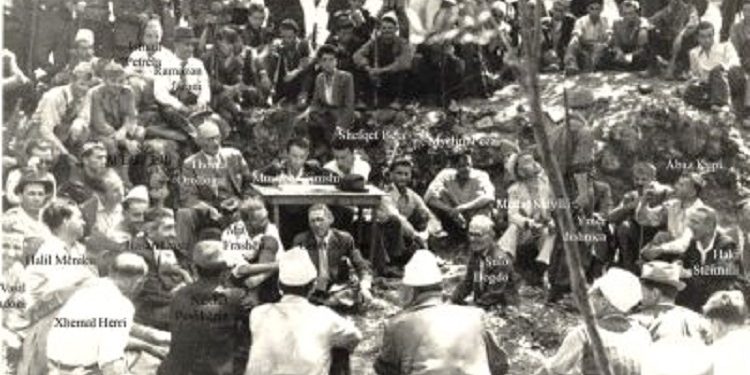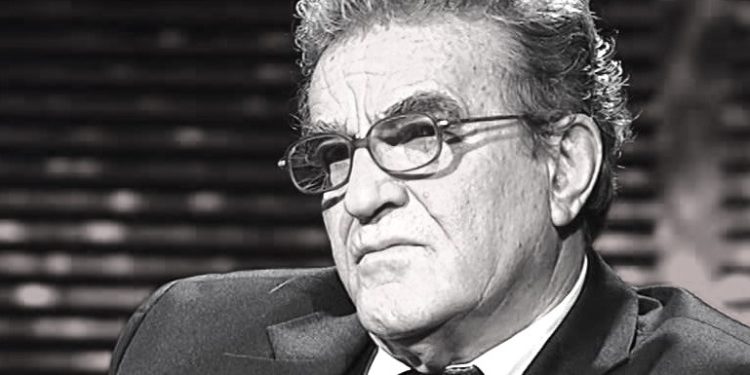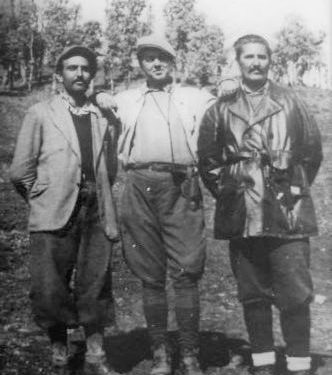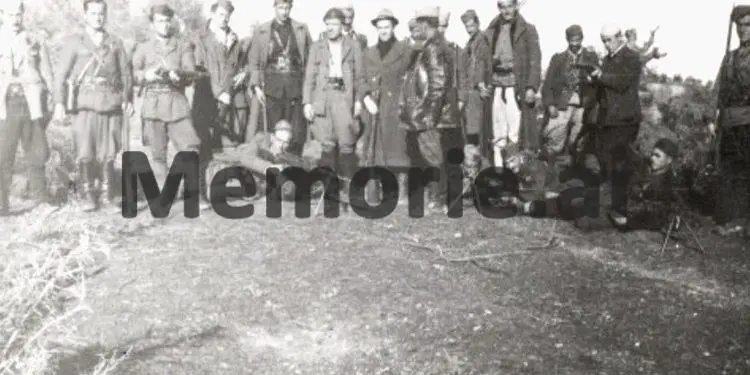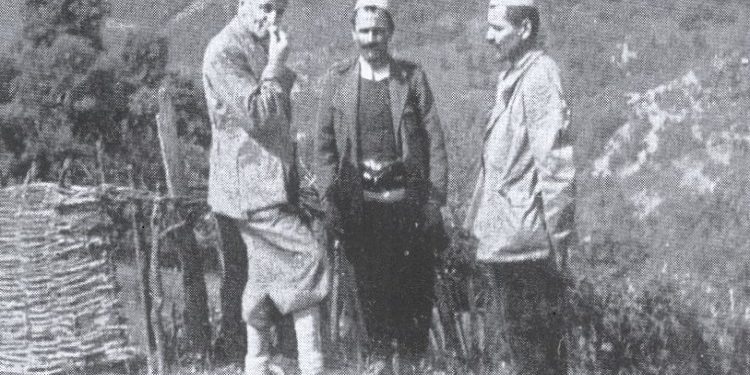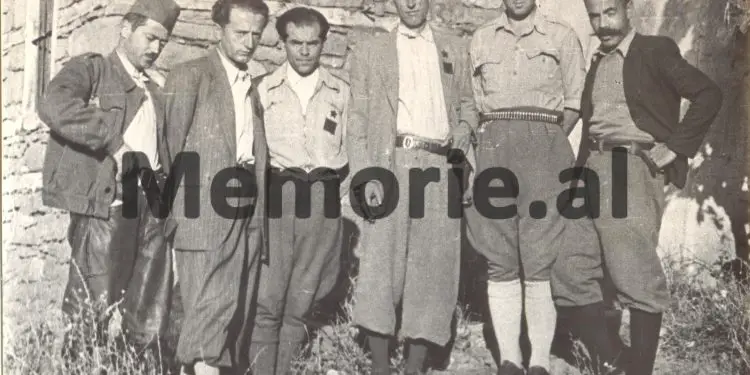By Elsa Demo
Memorie.al / In Albania, there was a civil war, victims, and the violent annihilation of a political and military force by the Communist Party and its wartime organs. The decisive role of the Yugoslavs, Popović and Mugoša, alongside Enver Hoxha, who uprooted the alliance of political forces for an ethnic Albania and a common liberation struggle. “The Civil War in Albania 1943-1945” a study with chilling facts about the killing of Albanians among themselves. Ten years of archival work by the scholar Uran Butka.
The fear that power might be shared with other political forces, or taken by them through free elections after the war, led the leadership of the Albanian Communist Party to take an arbitrary stance: civil war. “Yes, there was a real civil war in Albania. For two years, Albanians killed each other. And it did not happen in just one, two, or three villages and regions. From Dukat to Shkodër and Kosovo.”
“The Civil War in Albania 1943-1945” by Uran Butka is a study with chilling and shocking facts about the killing of Albanians among themselves, and about the actions of the authors of the civil war—the future leaders of the Albanians, who were subservient and inferior to Miladin Popović and Dušan Mugoša, who turned out to be just as active in this civil war of their neighbors as Enver Hoxha himself.
“I am breaking a taboo, a fetish, and a stance cemented by a totalitarian system, but also by engaged historians for more than half a century. It’s not simple and it’s not easy. It’s an effort for another kind of liberation, a historical and human one,” says the author at the beginning of the interview and the presentation of the first moment of the start of the civil war in the fall of 1943.
Mr. Butka, you have just published the monograph “The Civil War in Albania 1943-1945.” What motives prompted you to address this topic?
This monograph is an examination of the civil war in Albania during the years 1943-1945, a topic that has been largely unaddressed until today. It was an internal, organized, and armed conflict between political and military forces, including the popular masses that supported them, a war with tragic consequences not only for that time. It is the unknown side, the self-destructive part, of Albanians during the Second World War.
It is recorded in the memory of the people, but it lives mainly in their subconscious as a fact and as an unbearable energy. On the other hand, it is also marked in the documents of that time, although it has remained hidden and unaddressed for non-historical motives, that is, mainly for reasons of power, politics, and ideology.
During more than 10 years of research in Albanian and foreign archives, I discovered the undeniable existence of a bloody civil war with thousands of innocent victims during the years 1943-1945, and even beyond. The historian’s duty is to objectively address historical events and periods, especially when they are unknown, or mistreated, politicized, and alienated by previous historiography.
So, the motive is historical. To be honest, I was also driven by a civic, human motive. Albanians still carry a mentality, psychology, and a broken and troubled conscience from that war; they feel spiritually divided and are often hostile to each other.
The disagreement that often divides Albanians in two even today, the restless conscience of the nation, the crisis of national identity, political conflict, etc., have their beginnings and their ideological, political, moral, and spiritual burdens especially from that war and from our treatment and attitude towards it.
We must bring it out of silence, reflect on it, overcoming the hatred, the fearful displays, and the reminiscences that it still radiates; we must free ourselves from the obstacles and taboos of the past, to better understand our current situation and to face the future with a clear consciousness.
The shaken souls of Albanians, not only from the continuous wars, traumas, and misfortunes they have experienced, but also from the great half-century deception and the misreading of history that continues even today are in most need of truth, justice, and peace.
Does the civil war “attack” the National Liberation War?
The Anti-Fascist War and the Civil War are not the same thing. The Anti-Fascist War against the Italian and German invaders (1939-1944), alongside the Great Anti-Fascist Allies, is a patriotic war of the Albanian people against the fascist-Nazi occupiers. It is not a war of just one side, or one organization, or party, as has been one-sidedly presented by politics and communist historiography, but it is the contribution of nationalists and partisans, of patriotic Albanians who fought for liberation.
Personally, I have great appreciation and respect for this war, for the sacrifices and the blood shed for freedom. Meanwhile, the civil war has its cause in the armed and bloody struggle for power, in the ideological war, in the Bolshevik revolution and the class struggle in Albania, led by the CPA and the Russian-Yugoslav emissaries. Dominated by the tasks of the communist revolution and the seizure of power through violence and blood, this war went beyond the scope of the Albanian people’s liberation struggle and pitted Albanians against Albanians.
Its consequences were devastating, it spread throughout all regions of the country and resulted in thousands of victims (not martyrs, because martyrs are those who fall for the liberation of the homeland in the war against foreign invaders). This war is presented in full in the 650 pages of the book, through 1158 Albanian, German, Italian, British, Yugoslav, and other archival sources, most of the documents previously unknown and unpublished.
You emphasize and document the role of the envoys of the Yugoslav Communist Party in the disagreement between Albanians and in the civil war throughout the Albanian space. Was this intervention decisive?
Yes, it was decisive. Because the Yugoslavs, and later the Russians, were truly leading the CPA, its Central Committee, and Enver Hoxha. Their goal and effort was to pit Albanians against Albanians, so that Bolshevism would triumph, and Albania would be destroyed from within, tied to the Yugoslav cart (along with Kosovo), and included in the communist empire of the East. The extremist leaders of the CPA were interested in this civil war in order to seize power through it.
Where did the confrontation between the left and the right begin in Albania?
As a social phenomenon, the civil war did not happen by chance, it did not start immediately. It has its beginnings with the fascist occupation of Albania, which paved the way for two opposing political and military currents: Balli Kombëtar (National Front) and the National Liberation Movement, both movements created as a reaction to the foreign occupation, but with different mentalities and political lines: one on the right, the other on the left, one national and the other internationalist.
These movements absorbed, entangled, and mobilized a significant part of the population in the villages and cities, thus causing a great division of society into two opposing camps, one led by the nationalist organization “Balli Kombëtar” and the other by the Communist Party. Initially, the resistance and the war against the occupiers had a patriotic character, which increased the size and prestige of these organizations.
Until the Assembly of Mukje, a spirit of understanding generally prevailed between the two main political and military organizations: Balli Kombëtar and the National Liberation Front. Each had its own distinct program, but at their core was the fight against the fascist-Nazi occupiers. Until that key moment in our history, the enemy was considered to be the Italian occupier since April 1939, as well as his ally, the German occupier, who had just appeared on the Albanian horizon.
The duality of the opposing political and military forces had the premises for both cooperation and the possibilities for confrontation, due to ideologies, power interests, and a deviation from the national ideal. The Conference of Peza, in September 1942, was a premise for cooperation based on the pluralist platform of the “union of all forces of the Albanian people regardless of religion, region, or political conviction.”
The participation in it of nationalists from Balli Kombëtar as individuals (Ramazan Jarani, Ismail Petrela, Halim Begeja, etc.), and even other nationalists in the leadership forums such as Abaz Kupi, Ndoc Çoba, Kamber Qafmolla, Myslim Peza, etc., constituted an opportunity for broader cooperation of the entire political spectrum in the fight for liberation.
Also, the decision at this conference for an immediate war against the occupier, leaving the choice of the form of the regime and the resolution of political differences for after the war, created an opportunity for cooperation with other political and military factors.
How and for what reason were the agreements between the nationalists and the communists undone?
In February 1943, a compromise was reached between the National Liberation Front and Balli Kombëtar for the formation of a Central Coordination Committee, which would coordinate their military actions. We are not sure who initiated it, but this is less important than the achievement of the compromise itself.
At the First Conference of the CPA (March 17-22, 1943), cooperation with the nationalists was sought and decided upon after debates, as they “are in agreement and good relations with the party” (Hysni Kapo), or “with the nationalists we must see the true essence: the alliance with us” (from the discussion of Nako Spiro), or “the existence of Balli does not disturb the Albanian being” (discussion of Ymer Dishnica).
Almost all the debaters noted the growing influence of Balli in the city and in the village; “The influence of Balli still has a place. We do not underestimate this influence…” and they expressed the need for coordination with it, even criticizing leftism: “Our unprincipled stance towards Balli can facilitate fascism’s work” (from the speech of Ramadan Xhangolli) and “Qemal Stafa had achieved good results with the nationalists, why should we achieve the opposite?” (Vasil Shanto).
With this common will, the regional commissions or coordination committees were established, and in this spirit, a series of local agreements were reached for a common war against the occupiers. In the ‘Mukje Agreement’ (August 1-2, 1943), a common struggle was decided upon under the leadership of a pluralist forum, which was called the ‘Committee for the Salvation of Albania,’ with representatives from both political and military organizations.
Under its leadership, on August 4, 1943, two days after the Assembly of Mukje, the battle against the Italians took place in Qafë-Shtamë under the command of Abaz Kupi, then a member of the National Liberation General Staff. After the ‘Mukje Agreement,’ a series of common actions and battles were also carried out throughout Albania, and this showed that the Anti-Fascist War in Albania was on the right track and had a national character.
This is precisely what frightened the Yugoslav emissaries, who made every effort to disrupt this pan-Albanian cooperation and to break the ‘Mukje Agreement.’ The main reason for the undoing of this Agreement, for the civil war, was the issue of power.
The fear that power might be shared with other political forces, or taken by them through free elections after the war, led the leadership of the CPA to that arbitrary stance and that anti-democratic act, which aimed at seizing power by force of arms, before the liberation war had even ended.
Who started the civil war, who became its authors and protagonists?
The civil war began immediately after the breaking of the ‘Mukje National Agreement,’ so it was the offspring of the disagreement between Albanians, but also incited by states or political circles that had direct interests in Albania. This war was started by the CPA and Enver Hoxha, incited by Russian and Yugoslav emissaries.
Enver Hoxha, increasingly consumed by the delirium of power, ordered through the circular of August 8, 1943, that; “we should not let the reaction take the reins from our hands.”
Another primary cause for the breaking of the agreement and the start of the civil war was undoubtedly the handling of the Albanian issue, especially the problem of Kosovo, formulated in Article 2 of the Mukje Agreement: “A struggle for an independent Albania and for the implementation of the universally recognized principle of self-determination of peoples, and guaranteed by the Atlantic Charter for an ethnic Albania,” accepted and signed by both delegations.
This determination directly affected the interests and goals of the Greater Serbian chauvinist circles that ruled in the Yugoslav Communist Party and who sought the perpetuation of Serbian power in Kosovo, as well as the complete subjugation of Albania, and even its subsequent inclusion within the Yugoslav Federation. Miladin Popović’s quick and decisive reaction against Mukje was understandable. When the acts of the Agreement were handed to him, he furiously tore them to pieces and threw them in Enver Hoxha’s face. / Memorie.al




